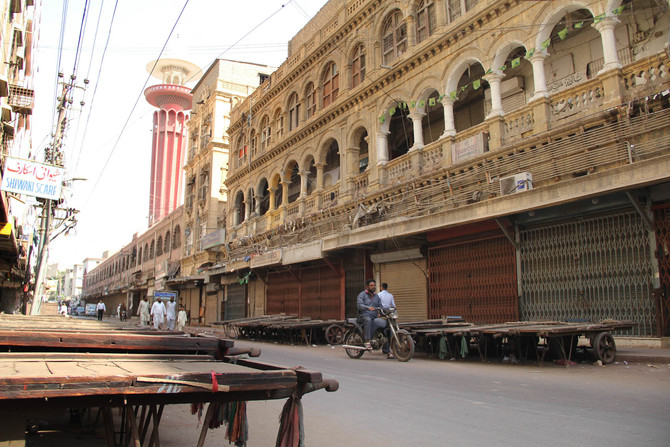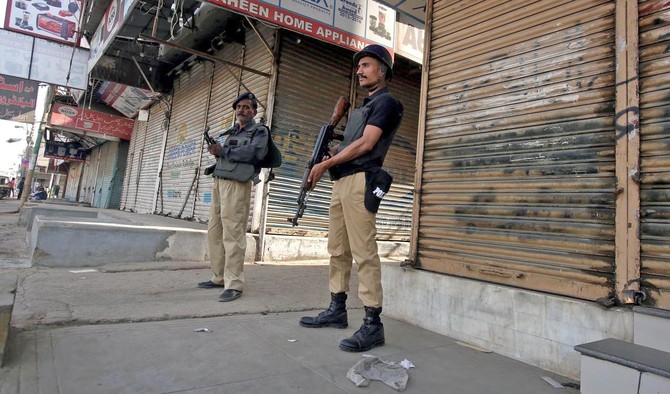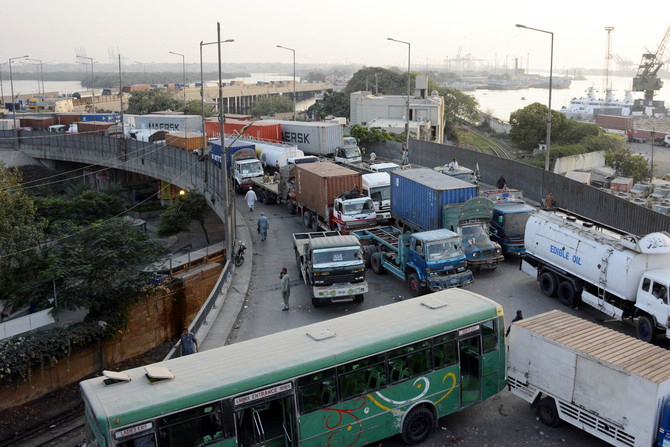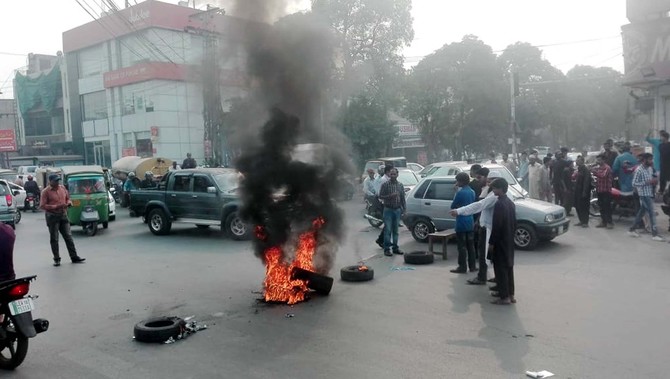KARACHI: Pakistan’s economy suffered a loss of Rs100 to Rs120 billion following the three-day countrywide protests called by religious parties rallying against the Supreme Court’s decision to acquit a Christian woman accused of blasphemy, traders and industrialists told Arab News on Saturday.
Life limped back to normalcy after an agreement was signed between the leaders of the Tehreek-i-Labbaik Pakistan (TLP), a far-right political party, and the government ending 72 hours of violent demonstrations that had paralyzed business activities across the country.
“The country’s daily business activities are worth Rs30-40 billion, which means it lost that much amount everyday during the protests which paralyzed industrial activities for three days,” Muhammad Danish Khan, President of Korangi Association of Trade and Industry (KATI), which represents one of the largest industrial estates of Pakistan, told Arab News.
He added that Korangi industrial, which was forced to cease its activities for the past few days on account of the nationwide protests, is host to nearly 4,000 small and large industries, including a refinery, and contributes Rs400 million every day to the national exchequer.
Highlighting the impact of the ill-timed protests, especially with Prime Minister Imran Khan visiting China to secure financial assistance and investment, Syed Mazhar Ali Nasir, Senior Vice-President, Federation of Pakistan Chambers of Commerce and Industry (FPCCI), said: “The cost of the country’s image and the exports is much higher from the economic numbers, especially at a time when the country’s prime minister is in another country to secure financial assistance and investment.”
Though no official figures detailing the actual loss to the economy have been released, industrialists and traders estimate it to be in billions, with the port city of Karachi impacted the worst, sending disturbing signals to the rest of the country about its economic health.
“Nearly 85 to 92 percent of cross border trade, particularly exports of Pakistan, are transshipped from Karachi. Approximately Rs7 billion of exports are lost during a one-day strike in Karachi. Similarly Rs17 billion worth of imports are disturbed due to this reason,” the FPCCI said.
As the industrial activities came to a grinding halt three days ago, the trading community also suffered losses due to a lack of sales. “We estimated that during the last three days our trading community has suffered around Rs100 billion losses. Small shopkeepers were mostly impacted by the events,” Khalid Pervaiz, President of All Pakistan Traders’ Association, said, while Atiq Mir, Chairman of Karachi Tajir Itehad, added that traders “incurred losses worth Rs15 billion in Karachi alone”.
“More than three million daily wagers turn up every day in the markets to earn their livelihood, with means of their livelihood blocked by this kind of protests,” Mir said.
Pakistan’s Karachi Port Trust (KPT) handles an average of 80,000 tons of cargo per day. “The shipping activities at the harbor during the protests remained normal but due to the non-availability of transport, movement of export and import goods remained suspended,” Shariq Amin, spokesman of KPT, said.
Pakistan’s industrialists and traders called for a comprehensive policy to tackle sensitive issues and violent protests. “Businessmen are the first victims of such violent actions. In such conditions who will place order from outside of Pakistan,” Nasir questioned.
“It is the responsibility of the state to stop violence and protect the life and properties of citizens,” Pervaiz said, adding that the government should take the business community into confidence and consult with them “because it’s the economy which guarantees the security and existence of the state”.
“All sensitive issues concerning politics and religion must be resolved at the table rather than on streets,” Nasir said, reasoning that negotiations should be the first and violence could be the last option. “Unfortunately in Pakistan, the last option is exercised in the first place,” he added.0
Businessmen pay Rs120bn as price for three-day protests
Businessmen pay Rs120bn as price for three-day protests

- Pakistan’s industries and markets remained shut following protests against SC verdict
- Country generates nearly Rs30-40bn revenue every day, traders say
Pakistan Super League 10th edition tickets go up for sale online

- The Twenty-20 tournament is set to begin from Apr. 11 and will feature over 30 matches
- Online tickets can be collected from designated TCS pick-up centers or delivered to home
ISLAMABAD: Online sale of tickets for the 10th edition of the Pakistan Super League (PSL) began on Thursday, the Pakistan Cricket Board (PCB) said.
The 10th edition of the PSL beginning on Apr. 11 will host 34 matches in Karachi, Lahore, Rawalpindi and Multan, with the final scheduled for May 18 at Lahore’s Qaddafi Stadium.
This season will feature top local and international players, following the usual format with group stages and knockout rounds, according to the PCB.
Tickets booked online can be collected from designated TCS pick-up centers or delivered directly to home.
“HBL PSL X tickets online sale has commenced from 3pm PKT today as the marquee event is all set to begin from Apr. 11,” the PCB said in a statement on Thursday.
Physical tickets for the tournament will go up for sale at designated TCS centers across the country at 4pm on Apr. 7 onwards, according to the board.
The stadium seating for each match is divided into four categories: General Enclosure, Premium, First-Class and VIP Stands, along with the exclusive HQSP PCB Gallery.
Ticket prices start at $2 (Rs650) for the general category. Regular match tickets can go up to $21 (Rs6,000) for VIP categories, while playoffs and finals may cost as much as $35 (Rs10,000) for VIP stands.
The PCB said it will also hold a ticket raffle at every match, with exciting prizes such as motorcycles, smartphones and gift hampers to enhance fan engagement and offer a unique match-day experience.
PM Sharif forms committee to probe Pakistan’s failure to utilize Hajj 2025 private quota

- Committee to probe why Kingdom’s Hajj policy was not implemented by Pakistan’s religion ministry through private Hajj operators
- Inquiry committee would also ‘fix the responsibility for this serious lapse, depriving thousands of Pakistani pilgrims from Hajj 2025’
ISLAMABAD: Prime Minister Shehbaz Sharif has formed a three-member inquiry committee to investigate why Pakistan had failed to utilize the private Hajj 2025 quota by not complying with certain requirements of the Kingdom’s Hajj policy, a notification by the Cabinet Division said on Thursday.
Pakistan and Saudi Arabia signed the Hajj Agreement 2025 in January, according to which 179,210 Pakistanis were expected to perform the annual pilgrimage this year. The quota was divided equally between government and private schemes.
However, the South Asian country failed to fully avail the private Hajj quota and the inquiry committee, led by the Cabinet Division secretary, would investigate the reasons behind the lapse. The probe panel also includes the chairman of Pakistan’s Federal Board of Revenue (FBR) and the Gilgit-Baltistan chief secretary.
“The Prime Minister, while taking serious notice for non-availing of the private Hajj quota for Hajj-2025 due to non-compliance of the requirements of the Kingdom of Saudi Arabia, has been pleased to constitute an inquiry committee on ‘Hajj Arrangements,’” the notification said, without specifying the number of private Hajj scheme seats that could not be filled.
It said the committee’s terms of reference would include inquiring why Saudi Arabia’s Hajj policy, revised in 2025, was not implemented by Pakistan’s Ministry of Religious Affairs and Interfaith Harmony through private Hajj operators.
The notification said the committee would also probe the ministry’s efforts to get the pre-requisite formalities completed by private Hajj operators by the target date set by the Kingdom.
The committee would also “fix the responsibility for this serious lapse, depriving thousands of Pakistani pilgrims from Hajj 2025,” it added.
Speaking to a private news channel, Pakistan Ulema Council Chairman Tahir Ashrafi praised Sharif’s move, describing it as a “step in the right direction.”
“Due to this, matters related to private Hajj pilgrims will improve in future and the current situation will also come to light, as to what happened and why did the delay take place,” Ashrafi told Express News.
In January, the Pakistani prime minister had chaired a meeting to review Hajj 2025 preparations, during which he had warned officials the government would not tolerate any negligence in their duties related to the annual pilgrimage.
Nationalist party supporters to march toward Balochistan’s capital for release of Baloch rights activists

- The Balochistan National Party-Mengal has been staging a sit-in in Mastung for the last one week to demand release of Dr. Mahrang and other activists
- Provincial minister Zahoor Buledi admits two rounds of talks with the protesters have failed to yield results, but says they will continue to negotiate
QUETTA: The Balochistan National Party-Mengal (BNP-M) has announced a march toward the capital of Pakistan’s southwestern Balochistan province on April 6, it said on Friday, amid a deadlock with authorities over the release of Dr. Mahrang Baloch and other Baloch ethnic rights activists.
Baloch and a few other activists were arrested on March 22 after they took part in a sit-in protest outside the University of Balochistan to demand the release of some members of her Baloch Yakjehti Committee (BYC) rights group, whom they allege have been detained by security agencies. They have since been charged with terrorism, sedition and murder after the demonstration ended in the death of three protesters, according to police documents.
The Pakistan army and the government have in the past variously referred to Baloch and her BYC as “terrorist proxies” who they say are allied with militant separatist groups like the Balochistan Liberation Army (BLA). Baloch and her group deny the charge and say they lead peaceful protests for the rights of the ethnic Baloch people.
On Friday, the BNP-M, which led supporters out of its chief Akhtar Mengal’s tribal heartland of Wadh in Balochistan’s Khuzdar district on March 28 to stage a sit-in at Lak Pass near the Mastung district, said its two-day ultimatum for the authorities to release Baloch and other activists had ended and its would now move toward the provincial capital of Quetta.
“We are standing on our demands for the release of detained Baloch women activists, but the government committee is not hearing us seriously,” Sanaullah Baloch, a senior BNP-M member, told Arab News, accusing authorities of “digging trenches” at the Quetta-Karachi highway to stop them from reaching the provincial capital.
“We have decided to march toward the capital for another round of sit-in and protests.”
At least two rounds of talks between the government and BNP-M chief Mengal have failed to bear any result, while provincial authorities have suspended mobile Internet in Quetta for the last three days, citing “serious security threats.”
Zahoor Buledi, a senior Balochistan minister who is part of the negotiations, said the government is fully engaged in a dialogue with the BNP.
“Though we held two rounds of talks with Mr. Mengal, they didn’t bore any result,” he told Arab News. “Talks will continue.”
Balochistan, Pakistan’s largest province by landmass and rich in mineral resources, has been the site of an insurgency for the last two decades. The separatists accuse Islamabad of exploiting the province’s natural resources, such as gold and copper. Successive Pakistani governments have denied the allegations.
Police actions against Baloch activists have intensified after Baloch separatists earlier this month staged a dramatic train siege that officials said ended in around 60 deaths, half of whom were separatists behind the assault.
More than a dozen United Nations experts demanded this week that Pakistan immediately release detained Baloch rights defenders and halt its crackdown on peaceful protests.
Pakistan says UNSC inaction over Gaza humanitarian crisis setting ‘dangerous precedent’

- The statement came as Israeli airstrikes killed at least 100 Palestinians across the Gaza Strip on Thursday
- Envoy says Pakistan refuses to be part of ‘this moral bankruptcy,’ demands immediate ceasefire in Gaza
ISLAMABAD: Pakistan’s permanent representative to the United Nations (UN) has said the UN Security Council’s (UNSC) inaction over a humanitarian crisis in Gaza is setting a “dangerous precedent,” the Pakistani mission said on Friday, questioning Israel’s violation of the UN charter, international law and a ceasefire agreement with Hamas.
The statement came during an open briefing at the UNSC on the situation in Palestinian territories, which was convened by Algeria with the support of Pakistan, China, Somalia and Russia.
Pakistan’s Ambassador Asim Iftikhar Ahmad said the UNSC’s failure to implement its resolutions not only undermines the institution, but also erodes the international order built on the UN Charter.
“What is happening before our eyes is a travesty. It is unacceptable. The council must act. We cannot be part of a body that remains a mere spectator and does nothing,” he said.
“We refuse to be part of this moral bankruptcy, and what our Slovenian colleague referred to as ‘erosion of humanity’.”
The statement came as Israeli airstrikes killed at least 100 Palestinians across the Gaza Strip on Thursday, including 27 or more sheltering at a school, according to Palestinian medical authorities, in a stepped-up offensive that Israel’s military said is intended to pressure Hamas. More than 30 other Gaza residents were killed in strikes on homes in the nearby neighborhood of Shijaiyah.
The first phase of the ceasefire between Israel and Hamas went into force on January 19 after 15 months of war, which began after Hamas attacks on Israel on Oct. 7, 2023. Israel said on March 19 that its forces resumed ground operations in the central and southern Gaza Strip. It also announced a major expansion of military operations in Gaza on Wednesday, asking residents to evacuate targeted areas. UN humanitarian office said around 280,000 Palestinians have been displaced since Israel ended the ceasefire with Hamas last month.
The fresh evacuation orders came a day after senior government officials said Israel would seize large parts of the Palestinian territory and establish a new security corridor across it. To pressure Hamas, Israel has imposed a monthlong blockade on food, fuel and humanitarian aid that has left civilians facing acute shortages as supplies dwindle — a tactic that rights groups say is a war crime.
Ambassador Ahmad lamented that Gaza has descended into an “abyss of suffering,” which is manifested from the way unarmed civilians including children, women, humanitarian workers, UN personnel and journalists as well as civilian infrastructure such as hospitals and schools are being attacked indiscriminately.
“Nothing is spared, not even the historic cultural sites. It is total annihilation, a situation where fundamental principles of humanitarian law are being disregarded with impunity,” he said.
Since breaking the ceasefire last month, the Pakistan UN envoy said, Israel has killed over 1,100 Palestinians, adding to the more than 50,000 killed between October 2023 and January 2025.
“This is not just warfare, it is the systematic destruction of a people,” he said.
He drew the council’s attention to Israel’s blockade of all border crossings, barring humanitarian aid with no food or medical supplies being allowed into Gaza.
“Starvation as a weapon of war is a war crime,” he lamented.
The Pakistani envoy strongly condemned the deliberate targeting of aid convoys, including the killing of 15 humanitarian workers on March 23, saying that more than 400 humanitarian workers, including 284 UNRWA personnel, have been killed in Israel’s war on Gaza.
“When UN staff and humanitarian workers are gunned down with impunity, we must ask: what remains of the global order we built from the ashes of World War II? ”
Ambassador Ahmad also said that Israel’s intent to permanently colonize and annex the occupied West Bank is alarming and unacceptable.
“Equally concerning are Israel’s plans to seize territory in Gaza, including the establishment of a so-called ‘security corridor’,” he said. “This would constitute a dangerous escalation and a violation of international law.”
Ambassador Ahmad called upon the UNSC and the international community to go beyond “rhetorical condemnations” to concrete action, including immediate halt to hostilities and full implementation of the January 19 ceasefire in Gaza, lifting of Israel’s blockade to ensure unrestricted humanitarian aid, preventing forced removal of Palestinians or annexation of their land, and reviving a “credible peace process.”
Pakistan does not recognize Israel and has consistently called for an independent Palestinian state based on “internationally agreed parameters” and pre-1967 borders. The South Asian country has consistently called for a cessation of Israeli military campaign in Gaza and dispatched more than two dozen aid consignments for the Palestinian people since Israel began pounding Gaza in Oct. 2023.
Pakistan deputy PM directs authorities to finalize investment proposals with ‘friendly countries’

- Ishaq Dar chairs meeting on Pakistan’s investment proposals with friendly countries, says state media
- Says participants reviewed potential investments in infrastructure, petroleum, trade, and IT sectors
ISLAMABAD: Pakistan’s Deputy Prime Minister Ishaq Dar this week directed authorities to finalize selected proposals to bolster trade and investment with “friendly countries,” state-run media reported.
Islamabad has increasingly eyed foreign trade and investment that benefits its priority sectors in a bid to bolster its fragile $350 billion economy.
It formed the Special Investment Facilitation Council (SIFC) government body in 2023 to attract foreign investment in agriculture, livestock, mining and minerals, energy, tourism and other sectors from China, Saudi Arabia, the United Arab Emirates, Central Asian countries and other Gulf states.
“Deputy Prime Minister/Foreign Minister (DPM/FM) Senator Mohammad Ishaq Dar on Thursday directed that selected proposals should be finalized, reaffirming Pakistan’s priority to bolster economic, trade, and investment ties with friendly countries,” state-run Associated Press of Pakistan (APP) reported.
Dar issued the instructions while chairing the fourth inter-ministerial meeting on Pakistan’s investment project proposals with friendly countries, APP said.
“During the meeting, the committee reviewed briefs on potential investments in key sectors, including infrastructure, petroleum, trade, and information technology (IT),” the state-run media said.
Saudi Arabia is one of the countries Pakistan has aggressively pushed to forge closer business and investment deals with in recent months.
The two countries signed 34 business agreements last year for a whopping $2.8 billion. Sharif’s office said seven out of 34 MoUs signed with Saudi Arabia had been actualized into agreements worth $560 million.
In April 2024, the Kingdom also pledged to expedite a $5 billion investment portfolio for Islamabad.
Pakistan hopes foreign trade and investment deals with allies will help shore its foreign reserves and strengthen its fiscal position weakened considerably by a prolonged macroeconomic crisis.




















